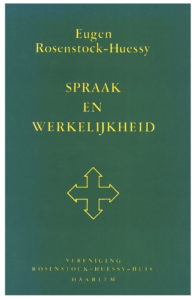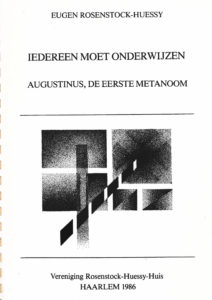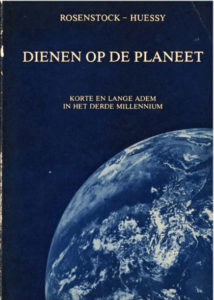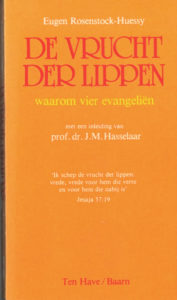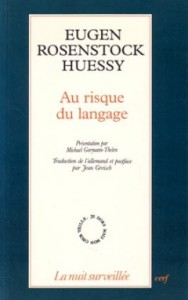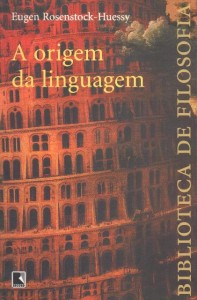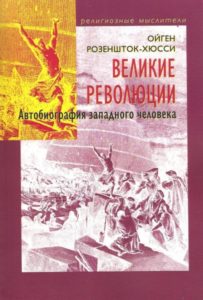Translations

In addition to the published translations listed below, the Eugen Rosenstock-Huessy Fund also offers access here to a number of draft translations and editions of Rosenstock-Huessy’s works, as yet unedited and/or unpublished. Translators who wish to add material to that page may contact the Fund by clicking here.
To promote the wider dissemination of his work, the Eugen Rosenstock-Huessy Literary Heirs have decided to allow open access to Rosenstock-Huessy’s published titles in German and English to all persons who wish to translate his works into languages other than German and English, and to all persons who wish to publish those translations. See more detail here.
Books in Dutch
RESPONDEO, an organization of people interested in Rosenstock-Huessy in the Netherlands, holds meetings twice a year and offers books by and about Rosenstock-Huessy in Dutch here.
Toegepaste Zielkunde
by Eugen Rosenstock-Huessy as Angewandte Seelenkunde. Translated from the German by Sam Hartman. Vereniging Rosenstock-Huessy Huis, Haarlem, The Netherlands, 1982. Paperback, 47 pages.
(For a description, see Practical Knowledge of the Soul.)
Toekomst, Het Christelijk Levensgeheim
by Eugen Rosenstock-Huessy as The Christian Future, or the Modern Mind Outrun and as Des Christen Zukunft, oder Wir überholen die Moderne. Translated by Ko Vos.
DABAR/boekmakerij Luyten, Aalsmeer, The Netherlands, 1993. Hardbound, 286 pages.
This edition was translated into Dutch from both the original English and the revised German edition. The preface is by J.H. Oldham. (For a description, see The Christian Future.)
Spraak En Werkelijkheid
by Eugen Rosenstock-Huessy, as Speech and Reality. Translated from the English by Elias Voet. Vereniging Rosenstock-Huessy Huis, Haarlem, The Netherlands, 1978. Paperback, 155 pages.
This edition has an introduction by Clinton C. Gardner. (For a description, see Speech and Reality
Iedereen Moet Onderwijzen, Augustinus, De Eerste Metanoom
by Eugen Rosenstock-Huessy, as "Jeder Muβ Lehren," a part of Die Sprache des Menschengeschlechts. Translated from the German by Sam Hartman and Hermien Vriezen-Rozemond. Vereniging Rosenstock-Huessy Huis, Haarlem, The Netherlands, 1986. Paperback, 36 pages.
In this essay Rosenstock-Huessy reflects on St. Augustine’s De Magistro. He praises teaching for granting us the power to compare living human time with abstract thinking, and names hope, faith, and love as the great powers of the human soul. More than mere virtues or dogmas, they are the forces which create time spans, and so underlie all history.
Dienen Op De Planeet korte en lange adem in het derde millennium
by Eugen Rosenstock-Huessy, as Dienst auf dem Planeten. Translated from the German by Dé Mulder and Elias Voet. Vereniging Rosenstock-Huessy Huis, Haarlem, The Netherlands, 1988. Paperback, 130 pages.
This edition has a preface by Bas de Gaay Fortman. (For a description, see Planetary Service.)
De Vrucht Der Lippen waarom vier Evangeliën
by Eugen Rosenstock-Huessy. Translated from the German by Elias Voet and Sam Hartman. Ten Have, Baarn, The Netherlands, 1981. Paperback, 126 pages.
This little book is the translation into Dutch of the essay Rosenstock-Huessy chose to make the capstone of his two-volume Die Sprache des Menschengeschlechts. In it he passionately defends the authority of all four gospels, and their life as Christ's "lips." He cites de Bruyne and Harnack for his argument, and finds internal evidence that the evangelists were not only aware of each other's work, but that each began where the last had left off, that each gospel evoked the next.
Rosenstock-Huessy wrote two different versions of this essay; both the 1954 English original and a translation of the 1964 German version are available in The Fruit of Our Lips.
Books in French
Au risque du langage
Les Editions du Cerf, Paris, published a French translation of Zurück in das Wagnis der Sprache, Au risque du langage, in 1997. It is in paperback and 160 pages long. In addition to the title piece, it contains "Datives Denken" from Heilkraft und Wahrheit and "Jacob Grimms Sprachlosigheit" from Das Geheimnis der Universität. Les Editions du Cerf is on the internet here.
Books in Portugese
A origem da linguagem
Brazil's Editora Record published Olavo de Carvalho's translation of The Origin of Speech in Portugese as A origem da linguagem as part of their Biblioteca de Filosofia series. It is available through Brazilian internet bookstores.
Books in Russian
Bеликие Революции (Great Revolutions)
The Fund sponsored the translation of Out of Revolution into Russian. The book was translated by Vitaly Makhlin, Oleg Osovsky, Alexander Pigalev, Igor Solomadin, Alexei Vasilyev and Igor Yefimov. The first edition of this translation was published by Hermitage Press in 1999 under the title Великие Революции (Great Revolutions). A Russian edition of this translation was published in 2002 by St. Andrew's Biblical Theological College, Moscow, Russia.
People interested in contacting Hermitage Publishers should write, call, fax or email: Hermitage Publishers, P.O. Box 410, Tenafly, NJ 07670, USA (201) 894 8247, Fax: (201) 894 5591, email: yefimovim <at> aol <dot> com
People interested in contacting St. Andrew's Biblical Theological College should write, call, fax or email: St Andrew`s Biblical Theological College, Jerusalem St. 3, Moscow, 109316, Russia Tel/fax: +7 (095) 2702200, +7 (095) 2707644, email: standrews <at> standrews <dot> ruOther Russian Translations
In Russia, Labyrinth Publishers released in 1994 the Russian translation of Speech and Reality. Canon Publishers in Moscow published in 1998 a collection of essays to be called God Makes Us Speak, edited by Prof. Alexander Pigalev of Volograd, which will include seven chapters from various publications of Rosenstock-Huessy. The Soros Foundation in Russia funded the publication of a book consisting of selections from Rosenstock Huessy's works, E. Rosenstock Huessy. The Speech of Humankind: Selected Writings, edited by Alexander Pigalev. The book appeared in the Soros series "Faces of Culture." "Faces of Culture" is a publishing project whose goal is to introduce the philosophical heritage of western thinking to Russia. "Faces of Culture" has also included the works of Paul Tillich, Karl Mannheim, and Wilhelm Windelband.


